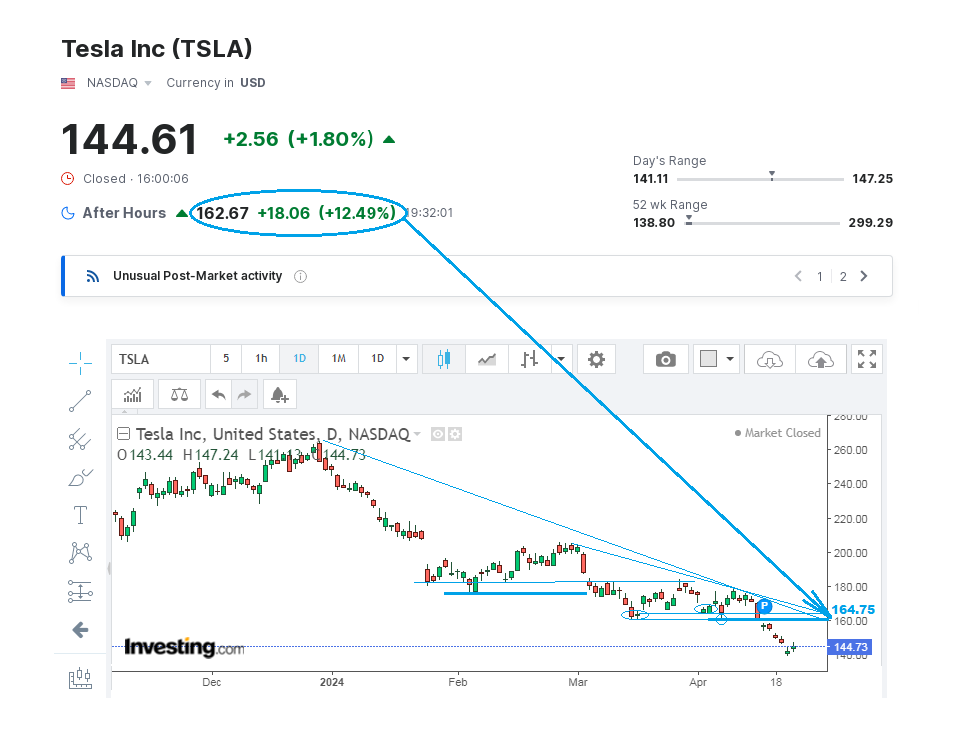Tesla Rally is Seen Fragile
Shares of Tesla spiked to near $160 after showing a double-digit percentage growth in after-hours trade on Tuesday night. The most inspiring manufacturer of electric cars said it is ready to accelerate the rollout of a more affordable model, usually known as the Model 2. Tesla plants may offer these new vehicles in the first months of 2025, which is ahead of previously announced timeframes. During a conference call after the company's quarterly report, its founder and CEO Elon Musk mentioned production could be launched "early in 2025, if not late this year", compared to his own words in January when he had cited the second half of 2025. The news followed media reports, which claimed only about two weeks ago that Tesla management allegedly paused its plans for the Model 2. And now potential consumers and shareholders revived their bets on paying about $25,000 for a mass-market electric car soon.
Neither Elon Musk, nor his colleagues did not directly respond to those freeze-of-the-project gossips. They also didn't name a potentially affordable car as the Model 2, rather discussing the launch of some unidentified “new vehicles, including more affordable models,” that would “be able to be produced on the same manufacturing lines” as Tesla’s current line-up, partially using “aspects” of its current platform as well as a next-generation platform. Looking from the other side of the issue, Musk cautioned that it might lead to "achieving less cost reduction than previously expected”. Besides, Tesla mentioned a “purpose-built robotaxi product” that it planned to build with a “revolutionary” manufacturing process, without offering a timeline for its release. Reuters reported in early April that Tesla planned to continue developing a self-driving and robotaxi-based ride-hailing service, without discussing any particular timeline for this release. Musk reiterated his well known sentence that Tesla is the AI company, not just an automotive market player, this time adding that Tesla is in talks with “one major automaker” to license its driver assistance system.
These bright stories overshadowed all negative aspects, like that Tesla's Q1 2024 revenue declined to $21.30 billion from $23.33 billion YoY, compared to $25.17 billion in Q4 2023. It was also notably lower than $22.2 billion of consensus expectations. This represented the biggest decline since 2012, worse than the negative pace in the first pandemic year of 2020, according to CNBC news. Tesla deliveries degraded to 386,810 vehicles all over the world, down from 433,371 in the first three months of 2023. This happened in sync with ongoing price discounts for Tesla cars in various regions of the world. Net income lost 55% to $1.13 billion YoY, with EPS (earnings per share) amounted to $0.45 vs $0.50 expected, compared to $0.85 a year ago and $0.71 in the Christmas quarter. A pessimistic view for the rest of 2024, when the “volume growth rate may be notably lower than the growth rate achieved in 2023”, was repeated once again.
This sounds a little bit strange that all the listed obstacles did not prevent Tesla stock from soaring by 12.5% higher after the closing bell. Worries about currently weaker deliveries, especially because of Chinese competitors, may cool the ardour of newly-minted Tesla bulls and even its older fans. It still can regress to falling down again at every moment, at least before the weekly closing price would not exceed the technically critical resistance area between $160 and $163 per share.

Disclaimer:
The comments, insights, and reviews posted in this section are solely the opinions and perspectives of authors and do not represent the views or endorsements of RHC Investments or its administrators, except if explicitly indicated. RHC Investments provides a platform for users to share their thoughts on financial market news, investing strategies, and related topics. However, we do not guarantee the accuracy, completeness, or reliability of any user-generated content.
Investment Risks and Advice:
Please be aware that all investment decisions involve risks, and the information shared on metadoro.com should not be considered as financial advice. Always conduct thorough research, seek professional advice, and exercise caution when making investment decisions.
Moderation and Monitoring:
While we strive to maintain a respectful and informative environment, we cannot endorse or verify the accuracy of all user-generated content. We reserve the right to moderate, edit, or remove any comments or posts that violate our community guidelines, infringe on intellectual property rights, or contain harmful content.
Content Ownership:
By submitting content to metadoro.com, users grant RHC Investments a non-exclusive, royalty-free license to use, display, and distribute the content. Users are responsible for ensuring they have the necessary rights to share the content they post.
Community Guidelines:
To maintain a positive and respectful community, users are expected to adhere to the community guidelines of Metadoro. Any content that is misleading, offensive, or violates applicable laws and regulations will be subject to moderation or removal.
Changes to Disclaimer:
We reserve the right to update, modify, or amend this disclaimer at any time. Users are encouraged to review this disclaimer periodically to stay informed about any changes.









